
Foot health - how to care for your feet and choose the right shoes?
Healthy feet are the foundation of an active life. Find out how to recognize the most common foot problems, how to choose the right shoes for your foot health, how to take care of your hygiene and when to see a specialist.
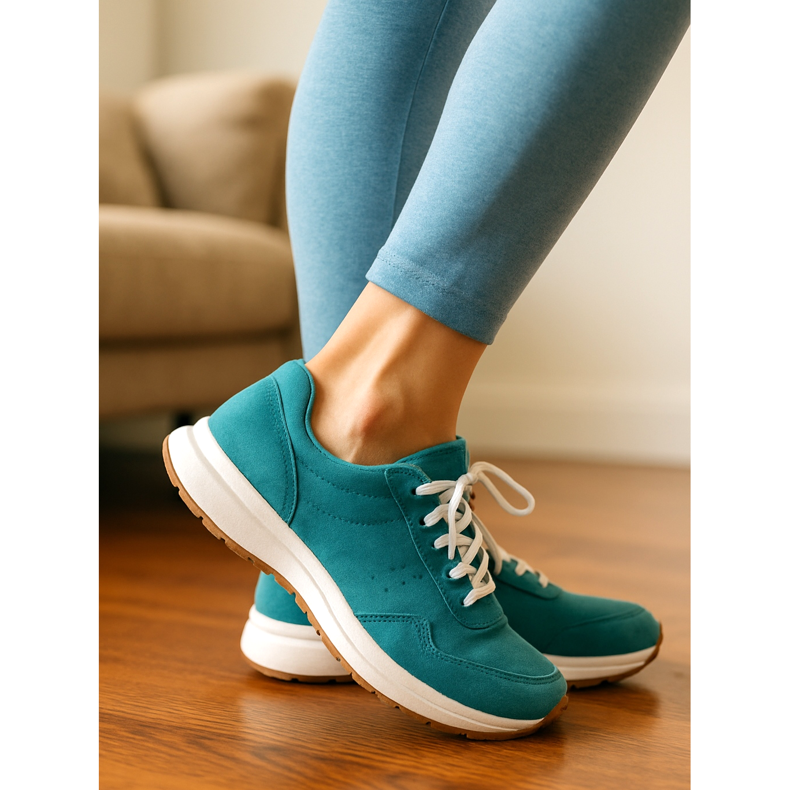
Why is foot health so important?
Feet are the foundation of your body - they carry your weight every day, cushion every step and enable you to move. Improperly fitting shoes can lead to a number of health problems: foot pain, back pain, knee pain, posture problems and long-term damage.
Healthy feet are not only a matter of comfort, but also of general well-being and quality of life. Foot diseases can limit activity, affect mood and even lead to serious medical complications.
In this guide, you will learn how to take care of your foot health, how to recognize the most common problems and how to choose shoes that will serve your feet and not harm them.
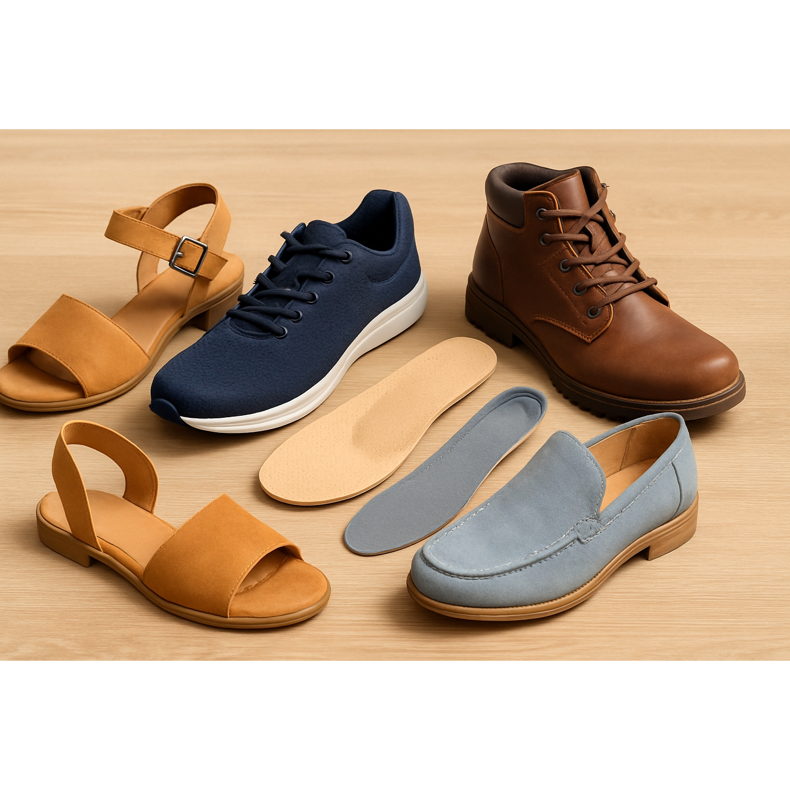
The most common foot problems
Hallux valgus
Symptoms: Hallux deformity - outward curvature, painful lump at the base of the hallux
Reasons: Genetics, too narrow shoes, high heels, flat feet
Solution: Wide shoes with a soft upper, orthopedic insoles, and in advanced cases - surgery
Flat feet
Symptoms: Missing foot arch, foot touching the ground with its entire surface, pain in feet and legs
Reasons: Genetics, weakened muscles, injuries
Solution: Orthopedic insoles with arch support, shoes with good arch support, strengthening exercises
High arch
Symptoms: Very high arch of the foot, excessive pressure on the heels and forefoot, pain
Reasons: Genetics, neurological diseases
Solution: Shoes with good cushioning, shock-absorbing insoles, shoes with a higher upper
Plantar fasciitis (inflammation of the plantar fascia)
Symptoms: Sharp pain in the heel, especially in the morning when taking the first steps
Reasons: Overload, lack of arch support, too hard surface
Solution: Orthopedic insoles, stretching, physiotherapy, shoes with good support
Foot fungus (athlete's foot)
Symptoms: Itching, peeling of the skin, cracks between the fingers, unpleasant smell
Reasons: Fungal infection in a warm, humid environment
Solution: Antifungal drugs, dry feet, airy shoes, shoe disinfection
Corns and calluses
Symptoms: Hard, thickened areas on the foot, sometimes painful
Reasons: Friction and pressure from the wrong shoes
Solution: Better fitting shoes, foot file, moisturizing, professional pedicure
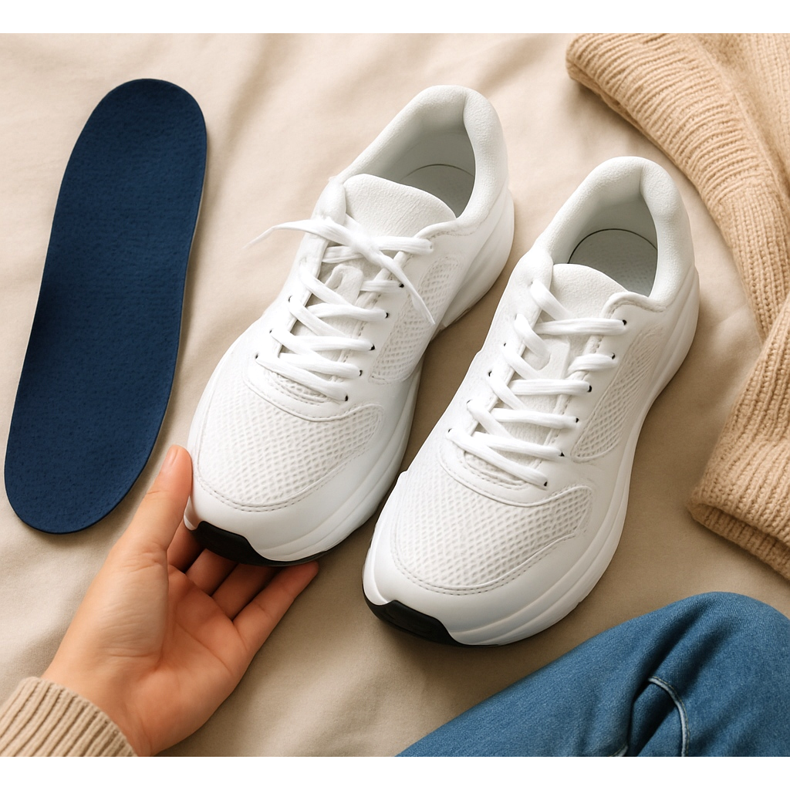
How to choose shoes for healthy feet?
1. Proper fit
- There should be a space of about 1 cm between the toes and the toe of the shoe
- Shoes must not press on the sides
- The heel must not slip
- Try on shoes in the afternoon (feet are swollen)
2. The right type of shoes for the activity
- For running: cushioned running shoes
- For walking: shoes with good arch support
- For work: comfortable, matching the dress code
- Everyday: comfort above all else
3. Foot arch support
Most people need arch support. If your shoes don't offer it, consider orthopedic insoles.
4. Depreciation
Particularly important for people who spend a lot of time on their feet. Protected joints and spine.
5. Suitable width
Standard width does not suit everyone. If you have wide or narrow feet, look for specialized models.
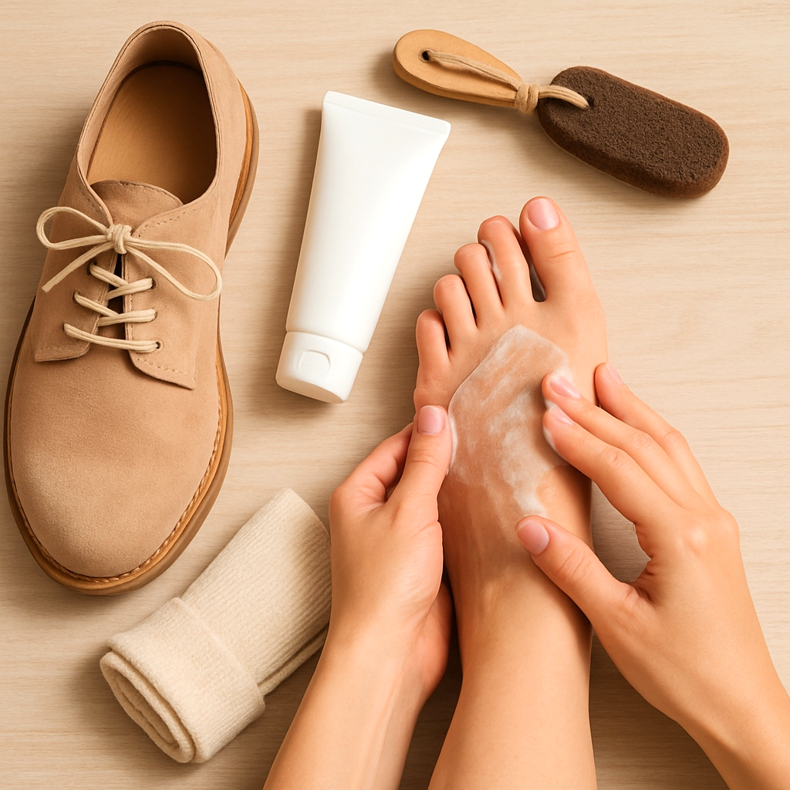
Daily hygiene and foot care
Wash your feet every day
- Use warm water and soap
- Wash between your fingers thoroughly
- Dry your feet after washing (moisture promotes mycosis)
- Pay attention to color changes, lumps and wounds
Cut your nails correctly
- Cut straight, do not round corners (prevents in-growing)
- Don't cut too short
- Use appropriate tools (pliers, not scissors)
Moisturize the skin of your feet
- Apply foot cream every day
- Especially heels (prevent cracking)
- Do not apply the cream between your fingers (moisture promotes fungal infections)
File calloused skin
- Use a pumice stone or a foot file
- Don't remove too much at once
- Regular filing prevents the formation of hard calluses
Wear clean socks
- Change your socks every day
- Choose natural materials (cotton, wool, bamboo)
- Avoid synthetics (they don't breathe)
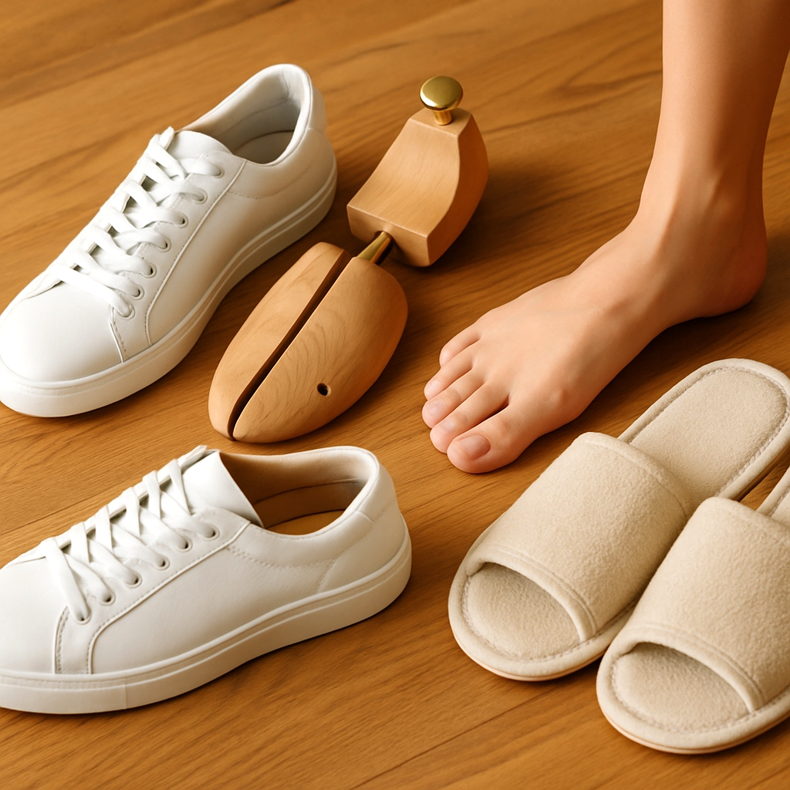
Habits that protect your foot health
Shoe rotation
Never wear the same shoes two days in a row. They need 24-48 hours to dry and regenerate.
Air your shoes
After removing it, place it in a ventilated place. Use wooden planers - they will absorb moisture.
Walk barefoot at home
It allows your feet to breathe and strengthens your foot muscles. If you need support - soft orthopedic slippers.
Stretch your feet
Simple exercises: turning the feet, bending the toes, massaging with a ball. Prevents soreness and stiffness.
Avoid walking barefoot on hard surfaces for long periods of time
Concrete, tiles - lack of cushioning puts stress on the joints. In the house OK, but not outside.

When to go to a specialist?
When to go to the doctor?
✗ Chronic foot pain lasting more than 2 weeks
✗ Deformations (halluxes, hammertoes)
✗ Swelling, redness, fever
✗ Difficulty walking
✗ Numbness, tingling
✗ Color changes, non-healing wounds
✗ Fungal infections that do not respond to treatment
Specialists:
- Podologist: Care, removal of corns, calluses, nail problems
- Orthopaedist: Deformations, injuries, structural problems
- Dermatologist: Fungal infections, skin diseases
- Diabetologist: For people with diabetes (special foot care)

Special cases
For diabetics
- Check your feet every day (diabetes reduces sensation)
- Avoid walking barefoot
- Wear shoes without internal seams
- Regular visits to the podiatrist
- Immediate reaction to wounds (they heal slower)
For older people
- Shoes with good support and non-slip soles
- Avoid high heels
- Regular balance exercises
- Helpful: Velcro shoes (easier to put on)
For athletes
- Specialized shoes for a specific discipline
- Replacing sports shoes every 500-800 km
- Stretching before and after training
- Foot massage after intense exercise

Summary
Healthy feet are the foundation of an active and comfortable life. Taking care of them is a combination of proper footwear, daily hygiene, appropriate habits and quick response to problems.
Remember: prevention is better than cure. Regular care, rotating shoes, good fit and listening to your body's signals are the key to lifelong healthy feet.
If you notice disturbing symptoms, do not ignore them - a visit to a specialist may protect you from serious problems in the future.